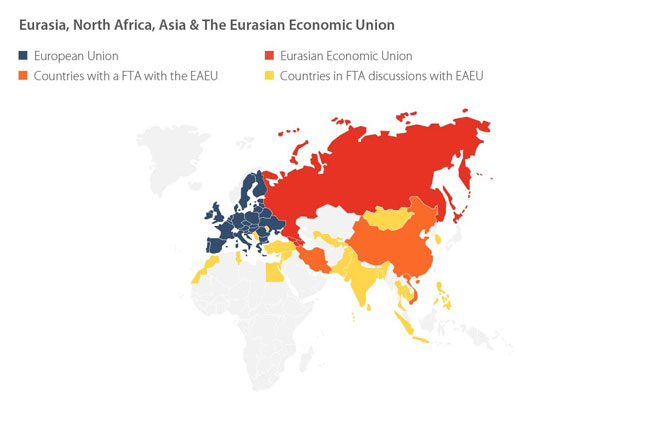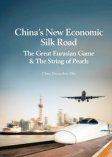Eurasian Economic Union Gaining Massive Regional Traction across Europe, Asia, and North Africa

The Eurasian Economic Union (EAEU), the Moscow supported free trade area that includes Russia, Armenia, Belarus, Kazakhstan and Kyrgyzstan has been quietly making inroads across the entire Eurasian landmass, in addition to North Africa and large parts of Asia. Having recently agreed to an admittedly low key free trade agreement with China, and having also agreed to an FTA with Iran and Vietnam, numerous other nations are stepping forward to be part of this new trade bloc.
In fact, the EAEU FTA with China has come in for some criticism from various academics, with Jurij Kofner, Head, Eurasian sector, CCEIS, Higher School of Economics (Moscow), saying: ” it does not entail lowering of tariffs and the creation of an FTA. In fact, the agreement is rather shallow in content and only outlines the procedures for the creation of working groups on specific areas of interest in the sphere of non-tariff barriers.” However, although correct, and nothing much to write home about today, the point of the FTA is that it is on the statute. As both the EAEU and China study the potential trade flows over time, adjustments can easily be made. It is far easier to make amendments to an already existing document than have to negotiate a new one. At this moment in time then, the EAEU and FTA are potentially interesting rather than having a major immediate trade impact. But that doesn’t mean that things will stay this way.
The EAEU itself still has to undergo some tax reforms to bring the Union into total compliance, for example. However, this in itself is normal; the other Asian regional trade bloc ASEAN also allowed time for its smaller member states – Cambodia, Laos, Myanmar and Vietnam – to get into tax compliance. The trick to understanding the EAEU is to be patient. At present, it is all about getting things into position.
Part of that strategy involves expanding the EAEU’s geographic reach. In this article we look at how discussions and negotiations are currently panning out between the EAEU and other European, North African, and Asian countries.

Discussions
ASEAN
In November 2016, the ASEAN Secretariat and the Foreign Minister of Armenia held meetings in Jakarta. The Foreign Minister of Armenia stated that Armenia is keen on forging cooperative relations with ASEAN and its Member States, and would also push for region-to-region cooperation between ASEAN and the Eurasian Economic Union. The Secretary-General of ASEAN also exchanged views on the potentials for closer cooperation between ASEAN and the EAEU. ASEAN also has Guest status with the Shanghai Cooperation Organisation suggesting a similar role within the EAEU is on the cards.
Azerbaijan
Azerbaijan’s ambassador to Belarus (an EAEU member) has stated “for our partners, as well as Azerbaijan, the union opens up great promises. It increases the market by several times and opens up great opportunities for our partners. We are optimistic about the future of this union.” He also expressed hope that the number of participants of the union will increase in the near future. Azerbaijan is part of the BRI with connections through to Turkey and Kazakhstan as part of the so-called “Middle Corridor.”
Japan
The possibility of establishing a free trade zone between Japan and the Eurasian Economic Union will be discussed “in the near future” Russian President Vladimir Putin said during a Russian-Japanese Business Dialogue meeting in December 2016.
Lebanon
On March 12, 2018, Armenia discussed the potential for the Lebanon to access larger markets within the EAEU during a meeting between the Lebanese and Armenian Prime Ministers in Beirut.
Morocco
Morocco signed an economic cooperation memorandum with the EAEU in September 2017 to strengthen relations between the two sides. Under the agreement, a joint group has been set up to discuss issues relating to economic cooperation between Morocco and the EAEU.
Free Trade Agreements
Bangladesh
Officials in Bangladesh are pushing for closer links with the Eurasian Union. The Ministry of Commerce of Bangladesh signed a Memorandum of Understanding with the EAEU in July 2016 and the country is seeking to sign a free trade deal. .
Cambodia
In February 2017, Cambodia signed an agreement with the Eurasian Union with the aims of expanding trade cooperation between the two sides. Cambodia is hoping to boost bilateral trade with EAEU member states. Neighbouring Vietnam already has an FTA with the EAEU that has seen a huge increase of Russian investment in particular into the country. Cambodia wants the same.
Egypt
In December 2016, the Presidents of Russia, Kazakhstan, Kyrgyzstan and Armenia approved proposals on the need to start talks on creation of a free trade zone between the Eurasian Economic Union and Egypt. On December 26, 2016, the President of Egypt confirmed the importance that Egypt assigns to the creation of a free trade area with EAEU. Earlier this month,Russia announced the establishment of a Free Trade Industrial Zone in Port Said.
India
In July 2016, negotiators from India and the Eurasian Economic Union gathered to discuss next steps of a Free Trade Agreement. India aims to bolster commerce and investments with the Unions member states and hopes to complete the FTA by late 2018 / early 2019. Although India is not part of China’s Belt & Road Initiative it is taking an active role in regional development, and is part of the International North-South Transport Corridor which links Mumbai with Moscow via Iran.
Indonesia
In November 2016, Indonesian government officials explored the possibility of forging a Free Trade Agreement with the EAEU. The Trade Minister of Indonesia stated that his country would follow other ASEAN members like Vietnam and Singapore by establishing closer trade links and creating new economic opportunities with the Eurasian Union. Talks began at the recent ASEAN-Russia Summit held in Jakarta three months ago,and are continuing.
Israel
In October 2016, Russian Ambassador to Armenia Ivan Volynkin said that the signing of a trade deal between the EAEU and Israel, one similar to between the EAEU and Vietnam, was being discussed.
Philippines
In May 2016, The Philippine Ambassador to Russia Carlos Sorreta responded positively to Russia’s calls for tighter relations and economic links between the EAEU and the Philippines. Some Russian analysts argue that the Philippines could be the key in Moscow’s ambition to forge a free trade agreement between the Eurasian Economic Union and the ASEAN bloc. This idea has gained positive feedback from Philippine policymakers.
Serbia
In November 2016, the Serbian Foreign Minister said Serbia plans on signing an integrated agreement with the Eurasian Economic Union. The Minister added that Serbia is planning to sign a common trade and customs agreement.
Singapore
In May 2016, the Prime Minister of Singapore witnessed the signing of a Memorandum of Understanding between Singapore and the Eurasian Economic Union. The move was aimed at bolstering economic ties and closer collaboration. The Prime Minister called the agreement a positive and concrete step towards deepening and widening engagement. Vladimir Putin has called the signing of a Free Trade Agreement with Singapore “A priority.”
South Korea
n February 2017, the government of South Korea announced that it will begin seeking Free Trade Agreements with entities such as the Eurasian Economic Union as a way to boost economic growth and cooperation.
Thailand
Thailand has confirmed its interest in creating a free trade zone with the Eurasian Economic Union. In July 2017, the Thai government was reportedly working on the final stages of an agreement.
Tunisia
In August 2016, the Ambassador of Tunisia to Russia stated that Tunisia was prepared to sign a trade deal with the Eurasian Economic Union to boost trade prospects. The Ambassador said much progress was made over the past year to create a special economic zone. Egypt just announced such a zone.
Membership
Moldova
Has recently become the EAEU’s first Observer nation, described as a “precursor” to joining the Union as a full member.
Mongolia
In September 2016, the press service of the Eurasian Economic Commission issued a statement after a meeting attended by Chairman of the Board of the Union Tigran Sargsyan and Ambassador of Mongolia to Russia Banzragch Delgermaa that Mongolia was considering seeking membership in the Eurasian Economic Union.
Pakistan
In June 2017, Pakistan had accepted Russia’s proposal to enter into a bilateral Free Trade Agreement. Russia also expressed support for Pakistan’s possible future inclusion in the Eurasian Economic Union.
Syria
In July 2015, Syrian Prime Minister Wael Halqi said that “Negotiations with Russia on joining the Eurasian Economic Union and customs-free zone are being held. We see this as a benefit and strengthening the relations with friendly states, which will facilitate economic and trade cooperation with them”, during a meeting in Damascus.
Tajikistan
Tajikistan plans to join the Eurasian Customs Union. The country has signed the CIS Free Trade Zone Agreement and is close to ratifying the treaty, however a border dispute with EAEU member Kyrgyzstan has arisen as a potential obstacle. Support for joining the bloc remains high in Tajikistan, according to polls conducted by the Eurasian Development Bank in October 2016, showing that 68 percent of people in Tajikistan favored membership.
Turkey
A statement by the Kazakhstan Presidential Office on the 6 June 2014 said that Kazakhstan President Nursultan Nazarbayev had extended an invitation to the President of Turkey for his country to join the Eurasian Economic Union. The statement was released the day after the fourth summit of the Cooperation Council of Turkic Speaking Nations on June 4 and 5 in the Turkish port city of Bodrum. However Turkey presently has a customs agreement with the European Union. It remains to be seen how and if Turkey can have agreements with both.
Turkmenistan
Turkmenistan is closely integrated economically with other Central Asian and CIS members. However, Turkmenistan has pursued a policy of political isolation and currently has no stated preference to either join or not join the EAEU. This is a policy not dissimilar to that of Switzerland and the EU.
Uzbekistan
In December 2016, Uzbekistan’s new President Shavkat Mirziyoyev reportedly revisited the topic of Uzbekistan potentially joining the Eurasian Economic Union. In April 2018, Uzbekistan began reforming it’s import tariffs and regulations to match EAEU norms, in an attempt to develop economic growth and mutual trade with other EAEU members.
These discussions show how geographically broad the EAEU has been in entering into discussions with other nations concerning enhanced co-operation, developing free trade, and membership of the bloc. However, the reach of the EAEU extends further.
In terms of the EAEU and Eurasia, North Africa and Asia, the potential for growth is immense. With many of these nations also now members of the Beijing backed Shanghai Co-Operation Organisation it is becoming obvious that a new world trade order is in the process of emerging. I have examined how the EAEU is making inroads into South America here. It may take time to begin to see the impact of this, however the mechanisms are being put in place. Businesses throughout the region need to keep abreast of these developments as they progress as new trade corridors and opportunities begin to open up.
About Us
Silk Road Briefing is produced by Dezan Shira & Associates. The firm provides strategic advisory and business intelligence to MNCs and Governments throughout Asia and China’s Belt & Road Initiative. For assistance please contact silkroad@dezshira.com or visit www.dezshira.com
 Related Reading:
Related Reading:
![]() After Trump, Putin and Xi – How the New World Trade Order Will Look in 2030
After Trump, Putin and Xi – How the New World Trade Order Will Look in 2030
![]() A Brave New World: China, Russia, and ASEAN Lead Eurasian Free Trade
A Brave New World: China, Russia, and ASEAN Lead Eurasian Free Trade
Silk Road and OBOR Business Intelligence
Dezan Shira & Associates´ Silk Road and OBOR investment brochure offers an introduction to the region and an overview of the services provided by the firm. It is Dezan Shira´s mission to guide investors through the Silk Road´s complex regulatory environment and assist with all aspects of establishing, maintaining and growing business operations in the region.
China’s New Economic Silk Road
This unique and currently only available study into the proposed Silk Road Economic Belt examines the institutional, financial and infrastructure projects that are currently underway and in the planning stage across the entire region. Covering over 60 countries, this book explores the regional reforms, potential problems, opportunities and longer term impact that the Silk Road will have upon Asia, Africa, the Middle East, Europe and the United States.







